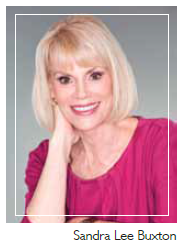Leave Nothing to Chance
 THE HOME HEALTHCARE PERSPECTIVE
THE HOME HEALTHCARE PERSPECTIVE
Sandra Lee Buxton identifies a family in crisis Working with a health care client in their home is a rewarding and intimate experience. You become a trusted confidant and resource in addressing any number of concerns, at times the least of which is health care.
When contacted for home health service the client, significant other or family member has identified a deficit and is looking for a solution. Many times the need is apparent but once involved with the client and family other issues surface which also need addressing. Chronic or acute illness affects the entire family and everyone adapts and copes differently, some with grace and others with discord. One unfortunate problem that I witness is the use of money in second marriages, particularly where adult children come into play.
Although it can be a gentleman caring for an ill wife I usually find the reverse. It is difficult when one partner cares for the other and adult children begin to offer “advice” on how things should be done and how much money should be spent. I believe it starts well intended but ends up in essence with a debate about “whose money is it anyways?”
Usually the issue is related to how much money should be spent to manage home health needs and the second wife and the ill partners children become at odds. On these occasions adult children seem to feel that their parents money is “theirs” and should be conserved for their personal use after death occurs. It’s sad when this is expressed especially when death does not seem to be the anticipated outcome. Even if tempers are managed it will create friction which then begins to affect everyone’s health and
may permanently sever relationships. There must be a better way, a plan which can avoid these stressful altercations and discussions.
THE FINANCIAL SIDE OF HOME HEALTH CARE AND DECISION MAKING
Jill Rapps Weighs in on a Family’s Financial Choices There are several challenges in planning around health care in second marriages. Communication is key – in second marriages, it’s important to communicate these issues before you marry. The last thing you want to talk about is what if one of us gets ill, or worse, what if one of us dies?
People often don’t know what to ask, especially when families are blended. It’s difficult enough to talk about such issues in a primary family, and still more challenging to weave in those topics when in a second or third marriage.
My best advice is to have a professional involved – and that could be someone like Sandra or whomever can help with that conversation. What kind of planning would make sense – what’s important to you when it comes to health care?
One of the biggest challenges as she said, is there can be a difference in assets. What if the spouse with little or no assets becomes ill? They might decide they want to help each other, or they may want to develop another health care plan. Keeping your estate planning documents current is also extremely important, including naming trustees. This is important, because for the parent who becomes ill, his or her children might not understand the health care needs of that parent.
There can also be a difference of opinion on how the remaining spouse should be supported. Having someone that’s unbiased can help out a lot getting the family away from the emotional side of it and execute the estate in the manner designated. At Ciccarelli Advisory Services, we often have people come speak at our office like Sandra, who can help a family make the best decisions. We offer them these options for connecting with
resources in this stage of their lives.
We tend to get very close to the family. Typically we may have known them in their first marriage or perhaps a spouse has died, or there is a divorce and we are meeting their second spouse. We advise clients to start going through health care and how to allocate funds to manage their lifestyle and expenses and the legacy they want to leave for their spouse and kids.
Sometimes it’s a case of assets – should you split them between the families or keep the assets between bloodlines? In most cases with a second marriage they tend to keep it separate because of the children.
However, you never know what might happen. We had a client who remarried for a second time. The wife had more assets than the husband. A year into that second marriage he wound up getting Alzheimer’s and dementia. His kids didn’t have the money to take care of him, so it was a challenging situation, but they had a plan.
After pre-planning, drawn up estate docs or have a pre-nuptial agreement and planned for healthcare, the other thing we suggest is writing a letter to the family or having a family meeting.
If you’re contemplating marriage and not currently working with a financial advisor, contact Jill Rapps at 239.262.6577 or visit www.casmoneymatters.com. For an appointment with Sandra Buxton to discuss home health care, contact her at sandra@mckenneyhomecare.com or 239.325.2273.
TOP TIPS
Rapps’ Top Tips for Sound Financial Choices in a Second Marriage
- Plan for these issues and discuss them before marriage
- Spouses should each write a letter to their respective families detailing their wishes
- Have a family meeting to discuss


Leave a Reply
Want to join the discussion?Feel free to contribute!